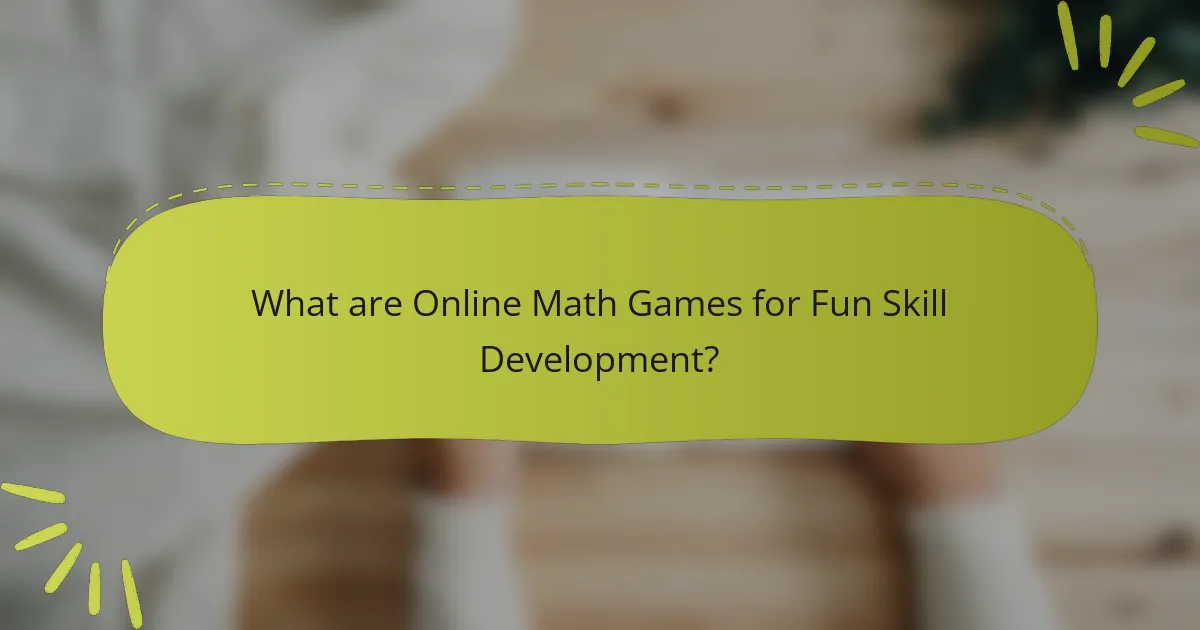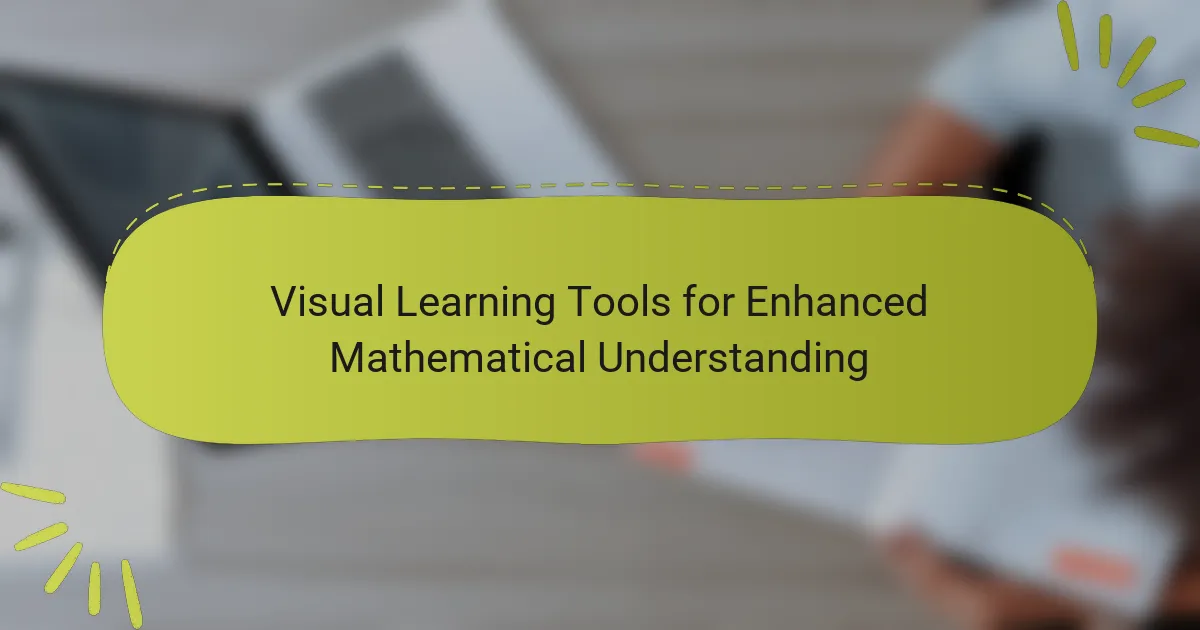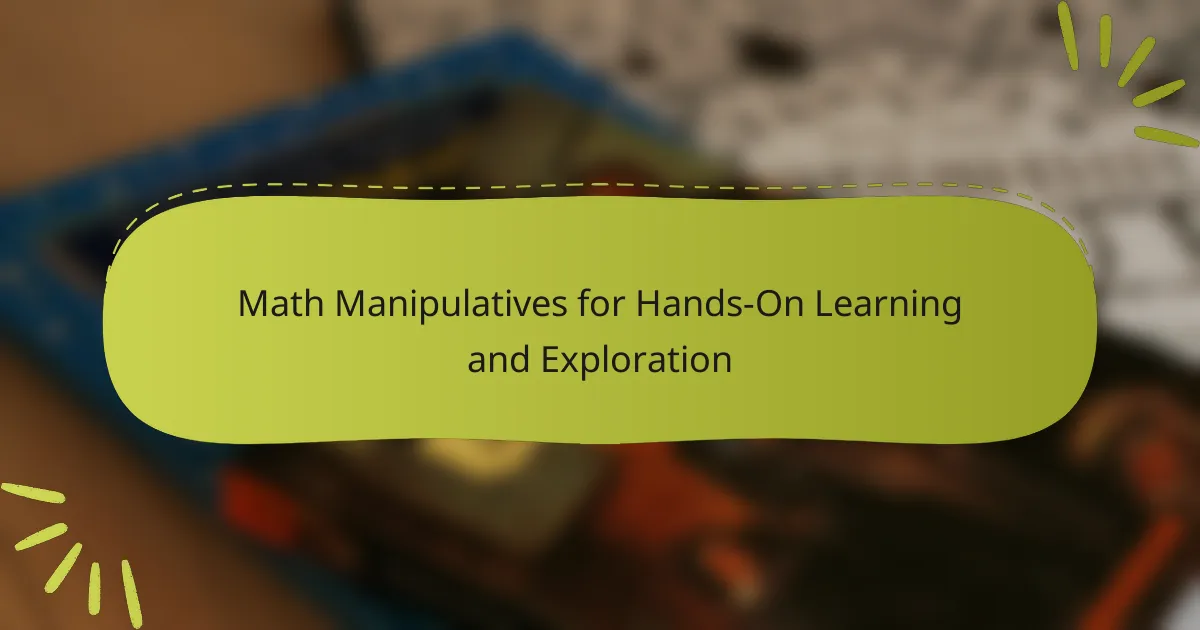Online math games are interactive digital platforms designed to enhance mathematical abilities through engaging challenges and puzzles. These games cover essential topics such as arithmetic, geometry, and algebra, allowing users to practice at their own pace while making learning enjoyable. Research shows that gamified learning significantly improves retention rates and student motivation, with notable improvements in test scores. Various types of online math games include puzzle games, quiz games, strategy games, and simulation games, each serving to develop math skills in a fun and competitive environment. Users can optimize their experience by selecting games that match their skill level, setting specific goals, and engaging with peers for collaborative learning.

What are Online Math Games for Fun Skill Development?
Online math games for fun skill development are interactive digital platforms designed to enhance mathematical abilities. These games engage users through various challenges and puzzles that require problem-solving skills. They often cover topics such as arithmetic, geometry, and algebra. Players can practice at their own pace, making learning enjoyable. Research indicates that gamified learning increases retention rates and motivation among students. For example, a study by the University of Colorado found that students who engaged in math games improved their test scores by an average of 20%. These games provide immediate feedback, helping users identify areas for improvement. Overall, online math games serve as effective tools for developing math skills while keeping the learning process entertaining.
How do Online Math Games enhance learning?
Online math games enhance learning by making mathematics engaging and interactive. They provide immediate feedback, which helps learners understand their mistakes in real-time. These games often incorporate rewards and challenges, motivating students to practice more. Research shows that game-based learning can improve problem-solving skills and retention of mathematical concepts. A study by the University of Colorado found that students who used math games scored 20% higher on assessments than those who did not. Additionally, online math games can accommodate different learning paces, allowing personalized learning experiences. This adaptability helps cater to diverse student needs and learning styles. Overall, the interactive nature of online math games fosters a positive learning environment.
What skills can be developed through these games?
Online math games can develop various skills. These include problem-solving abilities, as players must find solutions to challenges. Critical thinking is enhanced through strategic gameplay and decision-making. Additionally, these games improve mathematical skills, including addition, subtraction, multiplication, and division. Players also develop spatial awareness through geometry-related tasks. Time management skills can be honed as players work against timers. Furthermore, online math games often encourage teamwork and collaboration in multiplayer modes. Research shows that engaging with math games increases overall math proficiency in students.
How do these games engage different learning styles?
Online math games engage different learning styles by incorporating various interactive elements. Visual learners benefit from colorful graphics and visual representations of mathematical concepts. Auditory learners engage through sound effects and verbal instructions that reinforce learning. Kinesthetic learners are involved through hands-on activities and movement-based tasks within the game.
These games often include problem-solving scenarios that cater to logical-mathematical learners. They also provide collaborative features that support social learners through teamwork and competition. Research shows that games can enhance retention and understanding by appealing to multiple senses. This multifaceted approach ensures that diverse learning preferences are addressed effectively.
Why are Online Math Games important for skill development?
Online math games are important for skill development because they engage students in interactive learning. These games enhance problem-solving abilities and critical thinking. They make math concepts more accessible and enjoyable. Studies show that gamified learning increases retention rates. For example, a report by the Education Development Center found that students who played math games improved their test scores by 20%. Additionally, online math games provide instant feedback, allowing learners to correct mistakes in real-time. This immediate reinforcement helps solidify understanding. Furthermore, these games can be tailored to different skill levels, catering to diverse learning needs. Overall, online math games foster a positive attitude towards math and encourage continuous practice.
What benefits do they provide compared to traditional learning methods?
Online math games provide interactive engagement that enhances learning compared to traditional methods. They offer immediate feedback, allowing students to correct mistakes in real-time. This promotes a deeper understanding of mathematical concepts. Additionally, these games often adapt to individual skill levels, providing personalized learning experiences. Research shows that gamified learning can increase motivation and retention rates. For example, a study by Hamari et al. (2016) found that game-based learning significantly improved student engagement. Furthermore, online math games can be accessed anytime and anywhere, making learning more flexible and convenient. This accessibility supports continuous practice and skill development outside the classroom.
How do they help in building confidence in math skills?
Online math games help in building confidence in math skills by providing engaging and interactive learning experiences. These games often feature adaptive difficulty levels, allowing users to progress at their own pace. This personalized approach reduces anxiety associated with challenging math concepts. Additionally, frequent positive reinforcement and rewards in games encourage persistence and effort. Research shows that play-based learning can enhance motivation and self-efficacy in students. A study by Barata et al. (2013) found that students who engaged in educational games demonstrated improved confidence in their math abilities. Thus, online math games effectively foster confidence through enjoyable and supportive learning environments.

What types of Online Math Games are available?
There are several types of online math games available. These games can be categorized into various formats. Puzzle games challenge players to solve math-related problems. Quiz games test knowledge through multiple-choice questions. Strategy games require players to apply math skills for planning and decision-making. Simulation games create real-world scenarios that involve math applications. Educational platforms often feature interactive math games that adapt to different skill levels. Many games also incorporate elements of competition, allowing players to compete against others. Each type of game serves to enhance math skills while providing an engaging experience.
How do different types of games cater to various skill levels?
Different types of games cater to various skill levels by offering tailored challenges and learning experiences. For example, beginner games often feature simple math problems with immediate feedback. These games help users build foundational skills without overwhelming them. Intermediate games introduce more complex problems and require strategic thinking. They encourage players to apply learned concepts in new ways. Advanced games often include competitive elements and real-world applications of math. This keeps skilled players engaged and challenged. Research shows that adaptive learning technologies adjust difficulty based on player performance. Such customization ensures that all players can progress at their own pace.
What are the key features of educational math games?
Key features of educational math games include interactivity, engagement, and adaptability. Educational math games are designed to make learning fun and interactive. They often incorporate visual and auditory elements to enhance engagement. Many games adapt to the player’s skill level, providing personalized challenges. Feedback mechanisms are commonly included to help players understand their mistakes. Additionally, these games often promote critical thinking and problem-solving skills. Research shows that gamification in education can increase motivation and retention of math concepts. Studies indicate that students using educational games score higher in math assessments.
Which platforms offer the best Online Math Games?
Khan Academy, Prodigy, and Coolmath Games offer the best online math games. Khan Academy provides a comprehensive range of math exercises and interactive activities. Prodigy combines gaming with curriculum-aligned math challenges for students. Coolmath Games features fun, engaging math puzzles and strategy games. Each platform is designed to enhance math skills while ensuring an enjoyable experience. Their popularity and user reviews support their effectiveness in skill development.
What themes or subjects do Online Math Games cover?
Online math games cover various themes and subjects related to mathematics. These include arithmetic, geometry, algebra, and statistics. Games often focus on fundamental operations like addition, subtraction, multiplication, and division. They may also explore shapes, angles, and measurements in geometry. Algebraic concepts such as equations and inequalities are frequently included. Additionally, some games address data interpretation and probability in statistics. These subjects help develop essential math skills in an engaging way. Research shows that interactive learning through games improves retention and understanding of mathematical concepts.
How do these themes enhance the learning experience?
Themes in online math games enhance the learning experience by promoting engagement and motivation. Engaging themes capture students’ interest, making learning enjoyable. This enjoyment leads to increased participation and persistence in problem-solving. Motivational themes encourage students to overcome challenges, fostering resilience. Research shows that gamification in education leads to improved academic performance. A study by Hamari et al. (2016) found that game elements significantly increased student motivation and learning outcomes. Therefore, these themes create a dynamic learning environment that supports skill development in math.
What are some examples of popular math game themes?
Popular math game themes include adventure quests, treasure hunts, and space exploration. Adventure quests often involve solving math problems to progress through a story. Treasure hunts require players to solve equations to find hidden items. Space exploration themes use math challenges to navigate planets and complete missions. These themes engage players by combining fun narratives with mathematical skills. Research shows that themed games can enhance student motivation and retention of concepts.

How can users maximize their experience with Online Math Games?
Users can maximize their experience with online math games by selecting appropriate games that match their skill level. Choosing games that are neither too easy nor too difficult enhances engagement and learning. Setting specific goals for each gaming session can help maintain focus and motivation. Utilizing a variety of games promotes a broader understanding of math concepts. Regular practice through online math games can lead to significant skill improvement. Tracking progress over time provides insight into areas that need more attention. Engaging with peers or joining online communities can enhance the gaming experience through collaboration. Finally, parents and educators can support users by providing guidance and encouragement, reinforcing the learning process.
What strategies can enhance skill development through these games?
Engaging in online math games can enhance skill development through various strategies. These games promote active learning by requiring players to solve problems in real-time. Regular practice through these games reinforces mathematical concepts and improves retention. Setting specific goals within the games can motivate players to achieve higher levels of proficiency. Collaborative play encourages teamwork and communication, which are essential skills in mathematics. Utilizing adaptive learning features in these games tailors challenges to individual skill levels, promoting personalized growth. Incorporating rewards and achievements can increase motivation and engagement. Research shows that interactive gameplay enhances cognitive skills, making learning more effective.
How can parents or educators support children in using these games?
Parents and educators can support children in using online math games by providing guidance and encouragement. They should introduce age-appropriate games that align with the child’s skill level. Active participation can enhance the child’s engagement and understanding. Parents and educators can set specific goals for gameplay to foster a sense of achievement. Regularly discussing the game’s content helps reinforce learning. Monitoring screen time ensures a balanced approach to learning and play. Research indicates that structured support leads to improved learning outcomes in children.
What common challenges might users face, and how can they be overcome?
Users of online math games may face challenges such as lack of engagement, difficulty levels, and technical issues. To overcome lack of engagement, incorporating interactive elements and rewards can enhance user interest. Difficulty levels can be adjusted through personalized settings to match individual skill levels. Technical issues can be addressed by ensuring a stable internet connection and providing user support for troubleshooting. Research shows that personalized learning experiences improve retention and motivation in educational games.
What are the best practices for selecting Online Math Games?
Select online math games that align with educational goals. Look for games that cater to specific skills needed for development. Ensure the game has age-appropriate content and difficulty levels. Check for interactive features that engage students effectively. Assess the game’s ability to provide instant feedback and progress tracking. Read reviews and ratings from other educators or parents for insights. Choose games that offer a variety of math concepts to keep learning diverse. Verify the credibility of the game developer to ensure quality and educational value.
How can one assess the quality and educational value of a game?
To assess the quality and educational value of a game, one should evaluate its alignment with educational objectives. Check if the game reinforces key math concepts and skills. Analyze the game’s engagement level; a good game should maintain player interest. Look for feedback mechanisms within the game that support learning. Research shows that games with immediate feedback improve retention rates. Review user testimonials and expert evaluations for additional insights. Finally, consider the game’s adaptability to different skill levels, which enhances its educational effectiveness.
What factors should be considered when choosing games for different age groups?
When choosing games for different age groups, consider developmental appropriateness. Younger children benefit from games that focus on basic concepts like counting and shapes. Games for this age should be visually engaging and interactive. For older children, incorporate more complex problem-solving and critical thinking challenges. These games should promote strategic thinking and collaboration. Additionally, consider the duration of gameplay. Shorter sessions are ideal for younger players, while older children can handle longer, more immersive experiences. Lastly, ensure that the games are age-appropriate in terms of content and difficulty level. This helps maintain engagement and fosters a positive learning environment.
Online math games for fun skill development are interactive digital platforms designed to enhance mathematical abilities through engaging challenges and puzzles. These games cover various topics, including arithmetic, geometry, and algebra, and provide immediate feedback to help users identify areas for improvement. Research indicates that gamified learning increases retention rates and motivation, with studies showing significant improvements in test scores. The article will explore how these games cater to different learning styles, the skills they develop, and the benefits they offer compared to traditional learning methods. Additionally, it will highlight popular platforms, types of games, and strategies for maximizing the learning experience.



